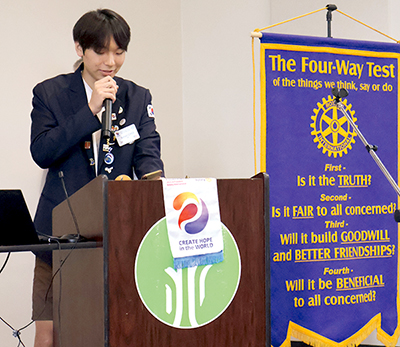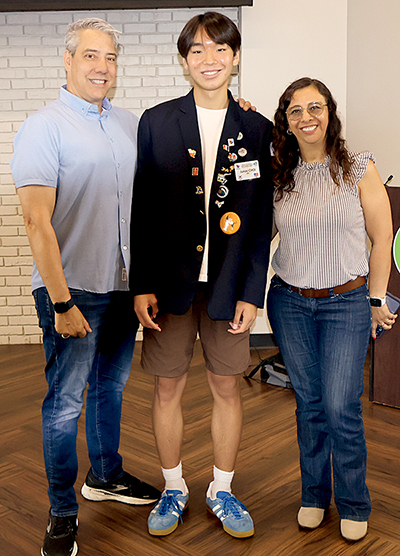Choi learns to value Kinsons, new friends, area life
Taking care of one of your own children is a task unto itself, but taking on an absolute stranger’s child from anywhere in the world is another thing entirely.
Many families, though, find it an invaluable experience and go head first into it, welcoming in a stranger they will come to know, and know they’ll have to say goodbye to, usually, much too soon.
The Kinsons are one such family. Tory, a member of the Rotary Club of Farragut, and his wife, Monica, opened their door and hearts to Junoo Choi about a year ago, saying goodbye to the South Korean exchange student Wednesday, June 5, before heading off the next day to Korea themselves to bring home their daughter, who also participated in the Rotary Youth Exchange.
Monica said over a Chick-fil-A lunch, Choi’s absolute American favorite, “He is like a child to me. ... I’m responsible for him, and I treat him like any other of my kids,” meaning there weren’t any exceptions in terms of chores, family rules, etc.
“I have been dreading this,” Tory told the crowd, seemingly missing him already.
“Today is the last day we’re going to have our son, Junoo, with us,” he continued, echoing his wife’s sentiment. “And I use that word ‘son’ in every sense of the word.”
Choi, 19 in his homeland, hosted by the Kinsons as part of the program, stood before the club last Wednesday to recount his “exchange journey,” as he called it, here in East Tennessee.
Shy, with soft, broken English, he confessed he had his doubts, noting it wasn’t easy in the beginning. “Flying over from the other side of the globe for a 20-hour flight and living with a family I didn’t know for a year was anything but smooth sailing.”
Especially, he added, regarding chores, including “having to clean up the dog poop,” igniting a roar of laughter.
But friendships didn’t just take like they do in movies or something. Choi expressed a genuine tough go of it, which nearly pushed him to call it quits and head home.
“The subtle racial discrimination and my inadequate language skills took a toll on my self-esteem. ... and every night, loneliness gnawed at me,” he said. It was affecting his new home life as well.
The social clouds began to part, though. When believing this trip to the United States was supposed to be life-changing, he realized he couldn’t give up because things were tough.
Realizing, too, that friendships are a two-way street, Choi, who attended Bearden High School, said, “I started making an effort. I initiated conversations to make friends, cracked jokes and pushed myself to approach people.”
And the sun shone down thereafter. “Buoyed by this newfound courage,” as he put it, he gradually started looking forward to school, daily making new friends, which had the subsequent effect of allowing him to sharpen his English skills, in turn making it easier to begin opening up to the Kinsons.
Having found a little glide in his stride, as they say, that newfound courage afforded him the confidence to slip on his dancing shoes, casting shadows at two proms, which, he said, don’t exist in Korea, where he “danced like there was no tomorrow.”
Throughout the year, chocked full of trips, ball games and events, the photographs and memories of which scrolled on a big screen on the wall behind him in the Farragut Community Center, Choi came to love the region.
“I found myself inadvertently growing as I encountered diverse people and experienced the vastness of the world,” he recalled. “I transformed from being merely pessimistic to becoming resilient, gaining the strength to rise again even after facing failure.
“I acquired the courage,” he went on, “to live and began contemplating my dreams.”
To the Kinsons, he closed by saying, “Thank you for making me an unforgettable experience. I love you so much, mom and dad.”
And with that, their “son” simply thanked everyone for listening to this exchange journey that had instilled so much in his life.
And with that, Tory took the microphone, explaining how Rotary prepares kids for the cultural “shock” that’s inherent with this program, but foreshadowing the shock teens experience returning to their previous lives.
Of his family back in Korea, he told Choi, “They don’t realize how much you’ve changed. You’ve learned confidence; you have drive; you have goals now. You’re going to be a different guy.”
He emotionally added, “You’re going to be a big, bright star in the world.”
The hope is they come back to the area later in life, equipped with the skills potentially to become business, community or political leaders, according to McKinley Tabor, chairman of inbound students for Rotary District 6780 who’s looking 20 to 30 years down exchange students’ lives.
“I guess in a way,” he said, “one of the big reasons I do this is, No. 1, when you give a kid this experience, it changes their life trajectory.”
RCF member Bill Nichols, who’s been working with the Rotary Youth Exchange since 2010 while instrumental in getting American students sent abroad, reflected on the program. “It’s a cultural exchange, not an educational exchange,” he said.
“Now (Choi’s) going to go back to his culture, and we want him to express a positive image of the United States.”
“You’re asking a family to open up their hearts and homes to a teenager from another part of the world they have never met,” Tabor said.
“It’s a big ask.”
This Rotary is seeking welcoming families now for at least two other students, a young man from Colombia and a young lady from Uganda, hoping, as was the case for Choi, that some other kids come and go with a brand new look at life having experienced a part of it they may otherwise have never known existed.




